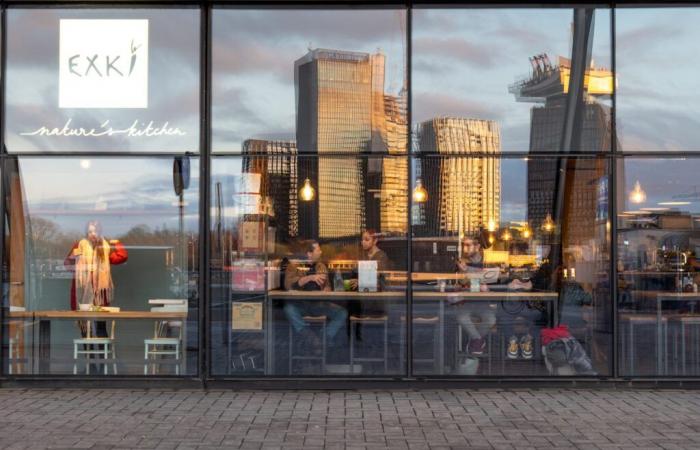Exki Amsterdam | Belga Image
Several years ago, Exki revolutionized the world of fast food in Belgium. Quality products, healthy food that you can eat on the go: that was the brand’s promise. She announced in the media that she was on the verge of bankruptcy. In question? Unprofitable choices, such as the establishment of unprofitable stores in France, but also the loss of frequency speed in the Horeca sector. So a question arises: does healthy fast food still have a future?
Is it really healthy?
When we go to Exki, we find different products, which allow us to make a choice. “It is an offer in which we can make healthy choices. It’s not because we go to Exki that we will necessarily eat healthily. But it is true that compared to other fast food offerings, it is an offering that makes it much easier to achieve nutritional objectives: moving towards whole grains, more vegetables, etc.“Because indeed, as Nicolas Guggenbühl, dietitian, nutritionist and professor at the Haute Ecole Léonard de Vinci, analyzes, you can very well go to this type of store and get cookies and very sweet pies.
An awareness?
Is the arrival of this type of healthy fast food on the market in line with a certain desire to eat better? “I think there is awareness, but it concerns part of the population. And in fact, the choices are always very complex, because on the one hand there is certainly the desire to rather eat balanced or eat better, especially since Covid. But aside from that, we know that there are other elements in food choices that come into play, starting with cost..”
Taste also plays a fundamental role in our choices. “This is important, not that what is healthy tastes less good, but spontaneously, we are more inclined to pay for calories than for salad or raw vegetables. Because our brain thanks us when we provide it with calories, which explains why the traditional offering of burgers, fries and sweet drinks is still very successful. It comes over the top for a large part of the population. It’s more important than the nutritional aspect.”
And in terms of price, the competition is tough. “This type of behavior which, in addition, can be found in price ranges lower than those practiced by fast food restaurants considered healthy, contributes to the fact that it undermines an Exki type offer.“, analysis Nicolas Guggenbühl.
A context of crisis
Currently, times are tough for many of us, which can have an influence on diet. “The crisis context, inflation, mental health, etc. All of this plays a role. That is to say all the stresses, whether at the geopolitical level, purchasing power, everything that is happening in the world, eco-anxiety, etc. We know that mental health deteriorates, that in this situation, we will be more inclined to seek small compensations through fatty, sweet and salty foods which will give us a little shot of cerebral dopamine which, in turn, in the space of a few minutes, will do good.”
But some healthy fast food brands have found the recipe to attract customers to their stores despite uncertain times. “The problem is that healthy eating is not necessary. This type of brand, in particular Exki, has nevertheless succeeded, I find, in developing an offer which is a good compromise between the healthy side and the good taste side, like the principle of salads, quinoa, with raw vegetables, vegetables, etc. But that’s probably not enough. We are in a context which is not favorable to healthy eating and which will rather encourage, favor, behaviors, I will say, a bit of survival.”
For whom?
Healthy fast food restaurants can continue to thrive in an unfavorable environment, but by finding the right ingredients. On the other hand, the entire population perhaps no longer has the means to spend almost €10 on soup and a piece of pie. “On the one hand, disadvantaged social classes already generally do not go to this type of store. The entire middle class is moving down a notch in terms of nutritional priority, and is changing its behavior. And people who don’t spend money, people who have a high level of education, high purchasing power, they are not going to change. We also see this very clearly in the Horeca sector. It’s the mid-range that suffers. Because the middle class, if it has difficulties, will eat less expensively and it can do it.”
Do healthy fast foods have a future? If they remain financially accessible, and taste follows, there should be no problems, but otherwise, the situation will become more complex…






